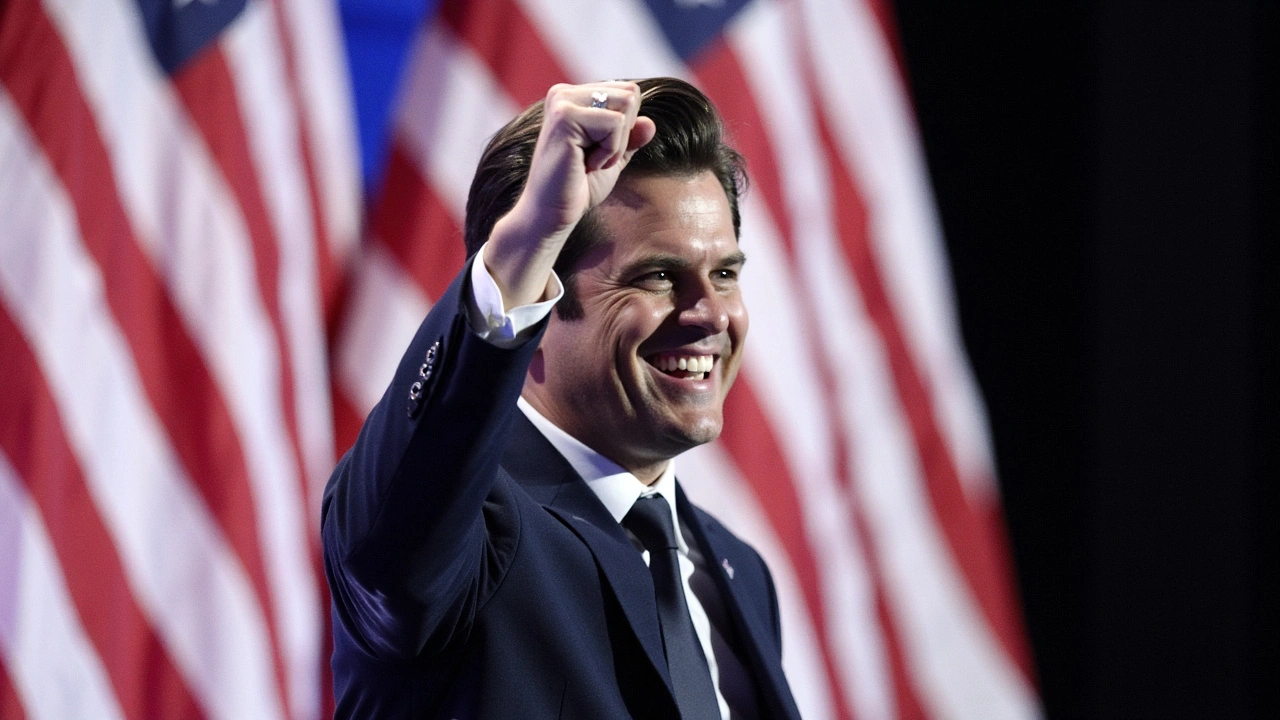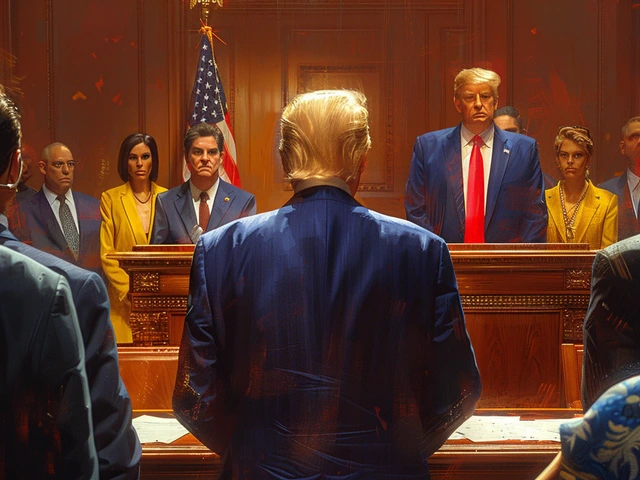Donald Trump Nominates Matt Gaetz for Attorney General
In an unexpected yet bold move, President-elect Donald Trump has announced his intent to nominate Representative Matt Gaetz—a staunch Republican from Florida known for his fierce loyalty to Trump—as his attorney general. This decision, revealed to the public through Trump's own communication channel on Truth Social, marks a significant political moment that has the potential to reshape the dynamics of the Department of Justice (DOJ). Gaetz, who is known for his contentious and vehement style, having served as an ardent proponent of the Trump administration's policies, is poised to lead a department that has not been without its controversies in recent years.
Gaetz, who at the age of 42, has already made a name for himself in the political arena, particularly when it comes to his fierce advocacy on issues central to the Trump agenda. His record in Congress, serving on the House Judiciary Committee, displays a clear pattern of challenging investigations such as the one into alleged Russian interference in the 2016 election. Notably, Gaetz has ardently critiqued the DOJ’s transparency and operation, which makes his nomination a topic of considerable interest and debate. This move by Trump is seen by many as part and parcel of his strategy to reconfigure the power structure and operational focus within the Justice Department.
Gaetz's prior experience with the DOJ is not unmarked by drama. In 2020, Gaetz was subject to an investigation concerning serious allegations of sex trafficking. However, the probe was closed without charges after federal prosecutors decided not to pursue the case. Trump’s statement highlighted Gaetz’s experience and emphasized his vision to end what he described as 'partisan weaponization' of the justice system. This language echoes a consistent narrative seen in Trump's rhetoric, aimed at painting the DOJ's oversight mechanisms as politically charged and biased.
The Path Ahead: Bold Assertions and Contested Terrain
With Gaetz’s nomination, a central question emerges: Can he credibly steer the DOJ while maintaining public confidence in its integrity and impartiality? Those who have been wary of the DOJ’s decisions find themselves watching Gaetz's potential impact closely, underscoring the controversies and decisions that await him should he assume office. Gaetz’s nomination comes at a crucial juncture, where calls for DOJ reform have grown louder, fueled by accusations of overreach and improper influence in political cases.
Trump's announcement was couched in terms of restoring faith and capability within the DOJ. The focus, according to Trump's statement, is not just on justice reform, but on broader themes such as border protection and dismantling criminal networks that pose threats to national security. How Gaetz approaches these priorities will be closely scrutinized, given the ongoing debates about immigration policy and crime prevention strategies.
Congressional Reactions and Political Ramifications
The nomination has reverberated through the halls of Congress. Matt Gaetz, who played a pivotal role in challenging the authority of former Republican House Speaker Kevin McCarthy, finds himself once again in the political spotlight. Gaetz’s sharp political maneuvering and his role in McCarthy’s political challenges have left an indelible mark, showcasing Gaetz's influence and controversial reputation among his peers.
This move by Trump is laden with potential implications for the ongoing discourse around separation of powers and the independence of the DOJ. Gaetz's outspoken nature and reputation as a combative figure make this a critical point of consideration as Congress evaluates his suitability for the role. Democrats and some moderate Republicans may express apprehensions about the independence of the investigations Gaetz will oversee, particularly those that might intersect with political matters and upcoming elections.
Looking Forward: The Future of the Justice Department
Should Gaetz be confirmed, he will oversee the FBI, the very institution that investigated him, which presents a widely discussed concern regarding conflict of interest. This raises questions about whether Gaetz, given his own upheaval-filled political journey, can lead with impartiality and foresight. The expectation is that his leadership will be put under a microscope, with both allies and detractors dissecting each move and decision.
As the nomination process unfolds, it will not only reveal the current political currents and alliances within the governing bodies but will also offer insights into broader questions about how trust and justice interlace in times of political transformation. Gaetz's confirmation will likely spur significant dialogue about the ideal characteristics and responsibilities of the nation's top law enforcement executives and how these roles should adapt in today's dynamic political climate.
For Trump, the nomination is emblematic of a broader strategy to embed trusted allies within key government structures. Gaetz's ascension to this role, pending confirmation, could mark a decisive pivot in how justice is perceived and implemented across American politics, influencing countless cases and laying the groundwork for Trump's anticipated policy directions during his term.










Shritam Mohanty
November 14, 2024 AT 18:30The nomination of Gauss for the top law slot feels like a gamble that could tilt the justice system toward partisan battles. Trump's push shows he wants allies who will fight his fights, and Gaetz fits that mold. The DOJ has been under fire for perceived bias, and this move amplifies that narrative. Critics say it's a power grab, but supporters claim it's about shaking up a stagnant establishment. Either way, the ripple effects will be felt across investigations that involve political figures. Gaetz's past controversies only add fuel to the fire. The Senate will have a tough time ignoring the public outcry. This could become a litmus test for how far the new administration will go in reshaping institutions. Many wonder if the FBI will survive under his watch. The optics are certainly troubling for those who value independence. Still, Trump's base sees this as a win against the so‑called deep state. The upcoming confirmation hearings will likely be a circus of accusations and defenses. It's a high‑stakes chess move that could either cement Trump's influence or backfire spectacularly. The broader question is whether this signals a shift toward more overtly political justice enforcement. Time will reveal the true impact of this bold nomination.
Anuj Panchal
November 18, 2024 AT 13:43The strategic calculus behind this pick is obvious: control the narrative and ensure the DOJ aligns with the administration's agenda. Gaetz's track record shows he's not shy about confronting investigations he deems politically motivated. By placing him at the helm, the president aims to cement a defensible stance against what he calls "weaponized" justice. This maneuver also sends a message to other officials about loyalty being rewarded. On the flip side, it raises alarms about potential conflicts of interest, especially with ongoing probes that could intersect with his past. It's a classic case of consolidating power by installing loyal operatives in key positions. The political fallout will likely be intense, with both parties gearing up for a showdown in the confirmation process. In the realm of political strategy, this is a bold, if risky, play.
Prakashchander Bhatt
November 22, 2024 AT 08:55While the move can be seen as a power play, it also underscores the growing distrust in institutions. Some view it as an attempt to neutralize perceived liberal bias, yet it might erode the credibility of the DOJ among moderates. Gaetz's legal background is limited compared to traditional candidates, which could affect the department’s operational efficiency. It's crucial to watch how this decision influences ongoing cases, especially those involving federal oversight. The balance between political loyalty and professional expertise will be tested.
Mala Strahle
November 26, 2024 AT 04:07From a philosophical standpoint, embedding a partisan figure into the justice system blurs the line between law and ideology. The very notion of impartiality gets compromised when the top attorney is a known advocate for a specific political narrative. This raises profound questions about the rule of law in a democracy that prides itself on checks and balances. If the DOJ's actions become overtly aligned with a singular political agenda, the public's trust may dwindle. Moreover, the precedent set here could embolden future administrations to appoint similarly contentious individuals, further entrenching partisanship within legal frameworks. It's a slippery slope that threatens the foundational principle that justice should be blind, not partisan.
shubham garg
November 29, 2024 AT 23:19This is wild.
LEO MOTTA ESCRITOR
December 3, 2024 AT 18:32Look, the appointment is a clear signal that loyalty outweighs substance in this administration. Gaetz's history of clashing with investigations shows he's ready to double‑down on the president's narrative. This could mean more aggressive tactics against perceived enemies of the state. The DOJ might become a tool for political retribution rather than a neutral arbiter. It's a concerning direction for anyone who values an independent justice system.
Sonia Singh
December 7, 2024 AT 13:44Just a heads up, the nomination might stir a lot of debate in the Senate. Expect a lot of back‑and‑forth during hearings.
Ashutosh Bilange
December 11, 2024 AT 08:56Yo, this is gonna be a drama fest! Gaetz in the AG seat? That's like putting a bull in a china shop. Everyone's gonna be talking, posting memes, and the media will have a field day. Can't wait for the circus that follows. Buckle up, folks.
Kaushal Skngh
December 15, 2024 AT 04:08Honestly, it's a bold but reckless choice. It feels like the administration is more interested in making a statement than ensuring competent leadership at the DOJ.
Harshit Gupta
December 18, 2024 AT 23:20Patriots will love this move because it shows the president is finally putting America first and not bowing to globalist pressures. Gaetz is a true defender of our values and will protect us from the deep‑state agenda that tries to undermine our sovereignty. This nomination is a clear sign that the administration is committed to restoring law and order and ensuring that the DOJ serves the people, not the elite. It's about time we have a tough, uncompromising leader who will stand up for the Constitution. This is the kind of decisive action we need.
HarDeep Randhawa
December 22, 2024 AT 18:33Yeah!!! This is absolutely insane; the whole scenario is a total nightmare for anyone who cares about justice! The idea of putting a political firebrand in charge of the DOJ is beyond ridiculous! It's like handing a loaded gun to someone who loves to cause chaos! Nobody should tolerate this kind of reckless appointment! The entire nation deserves better!
Nivedita Shukla
December 26, 2024 AT 13:45When one considers the profound implications of appointing a figure like Gaetz to the helm of the Department of Justice, the conversation inevitably expands beyond the immediate political calculus. The very architecture of our legal institutions rests upon an implicit social contract that binds the impartial administration of law to the collective trust of the citizenry. By inserting a known partisan operative into this delicate equilibrium, we risk eroding that trust in ways that may not be immediately apparent. One can argue that the oversight function of the DOJ could become compromised, as decisions may be filtered through a lens of political allegiance rather than adherence to statutory mandate. Moreover, the historical precedent set by such an appointment could embolden future administrations to prioritize loyalty over competence, thereby cultivating a revolving door of ideologically driven leadership. This trajectory threatens to transform the DOJ from an independent watchdog into an extension of executive ambition. In practical terms, ongoing investigations that intersect with political interests could be subjected to selective enforcement, undermining the principle of equal treatment under the law. The potential for conflicts of interest, especially given Gaetz's own entanglements with prior investigations, raises grave concerns about the integrity of prosecutorial discretion. Furthermore, the morale within the ranks of career lawyers and agents may suffer, as they grapple with the perception that their professional judgments are secondary to political directives. This internal discord could lead to a brain drain, where seasoned experts seek opportunities elsewhere, diluting institutional expertise. Public perception, too, is a critical factor; citizens witnessing a politicized DOJ may retreat into cynicism, believing that justice is merely a tool of partisan warfare. Such disillusionment can manifest in reduced civic engagement and diminished respect for legal outcomes. Internationally, allies and adversaries alike monitor the health of American democratic institutions, and a compromised DOJ could weaken diplomatic standing. It is also worth noting that the constitutional separation of powers is designed to prevent exactly this concentration of influence, ensuring checks and balances among branches. By allowing the executive to install a close confidant in a role that straddles legal interpretation and enforcement, we blur these lines. Finally, the broader societal impact cannot be ignored. When the highest echelons of justice appear politicized, marginalized communities may feel further disenfranchised, exacerbating existing inequities. In sum, while the nomination may satisfy immediate partisan goals, the long‑term ramifications for the rule of law, institutional integrity, and democratic resilience could be profound and detrimental.
Rahul Chavhan
December 30, 2024 AT 08:57Just a reminder that we should keep an eye on how this affects ongoing cases. Transparency will be key.
Joseph Prakash
January 3, 2025 AT 04:09Interesting move. Let’s see how the Senate reacts to this nomination. The hearings will be something to watch.
Arun 3D Creators
January 6, 2025 AT 23:21Putting a firebrand in charge of the DOJ is a recipe for chaos. The balance of power is at stake.
RAVINDRA HARBALA
January 10, 2025 AT 18:30The real question is whether the paperwork will even get through the Senate floor without a massive showdown. Expect a lot of procedural gymnastics.